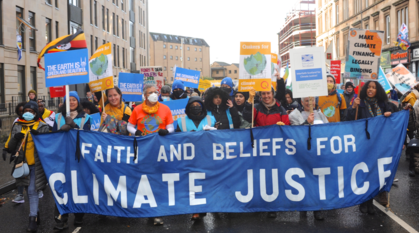Climate justice: a cause for cautious optimism?
A recent government announcement could signal a welcome shift in how Britain takes responsibility for its carbon emissions but that doesn't mean campaigners should ease the pressure, says Maya Williams.

When it comes to asking governments to step up to taking action to tackle climate change it is often easy to feel doom and gloom. However, in recent months there has been cause for cautious optimism.
The UK government has announced that it intends the UK to become a "net-zero" carbon economy in the next 30 years. The existing target is only to reduce emissions by 80% by 2050 – so this would be a big improvement on current plans.
The government will be consulting their independent experts on the issue and we hope to hear firmer commitments later this year. This could signal a massive shift in how it takes responsibility for the carbon that we emit as a country, and our role in working to avoid catastrophic climate change.
This announcement no doubt results from the grassroots pressure of the climate justice movement. It is thanks to this pressure that the Climate Change Act was passed in 2008, and the movement continues to work to hold the government accountable and push for greater responsibility and regulation.
Mixed messages
It's not all good news, however. In 2017 the government released its Clean Growth Strategy, which revealed that existing and new policies will significantly fail to meet the commitment to reduce emissions by 80%. It's clear that the government doesn't have the answers or ambition in the current proposals to make the changes needed to fully meet the carbon budgets as set out by Parliament.
Other recent announcements are also giving mixed messages around ambitions to cut carbon. For example, proposed changes will make it easier for fracking companies to test drill and get planning permission. As fracking is 5 times more carbon intensive than the recommended targets from the government's advisory body for the power sector, an increase in fracking across the country will make it even harder to meet any targets for a net-zero economy.
Keeping up the pressure
Given these mixed messages, as part of our Quaker commitment to sustainability, we need to keep up the pressure on the government to make strong and ambitious changes and not delay on difficult decisions.
Quakers across the country have been writing to MPs about the need for more ambition on climate change. But the majority of responses currently echo the official government line that Britain is firmly on track to meet the carbon budgets, which the government's advisors have shown is not true.
This shows both a lack of engagement and ambition from MPs. We need to work harder to show them what is possible.
What do we want to see?
There are many ways the government could work to reduce our collective carbon emissions. These include:
Energy: To reduce our reliance on fossil fuels, renewable energy needs to get more investment and be easily accessible at household, community and commercial levels.
Transport: The government have already committed to ban petrol and diesel cars by 2040, which is a big step. However, other countries have committed to do the same by 2030 – why can't we do it in this timeframe?
Buildings: The government has dropped standards aimed at making new buildings as energy efficient as possible. These could be brought back, and the standards also applied to old buildings. Increasing energy efficiency is crucial for cutting carbon and tackling fuel poverty, and is a great way of creating jobs.
Engage with your MP
While there are mixed messages coming from government, we should celebrate and support the modest but important steps they are making on climate change, and keep the pressure up for real action to be taken now to ensure it happens.
Now is the perfect time to engage with your MP around climate issues, to push for strong and ambitious changes to be introduced.


